Launching the #CPUOverload Project: Testing Every x86 Desktop Processor since 2010
by Dr. Ian Cutress on July 20, 2020 1:30 PM ESTGaming Tests: Red Dead Redemption 2
It’s great to have another Rockstar benchmark in the mix, and the launch of Red Dead Redemption 2 (RDR2) on the PC gives us a chance to do that. Building on the success of the original RDR, the second incarnation came to Steam in December 2019 having been released on consoles first. The PC version takes the open-world cowboy genre into the start of the modern age, with a wide array of impressive graphics and features that are eerily close to reality.
For RDR2, Rockstar kept the same benchmark philosophy as with Grand Theft Auto V, with the benchmark consisting of several cut scenes with different weather and lighting effects, with a final scene focusing on an on-rails environment, only this time with mugging a shop leading to a shootout on horseback before riding over a bridge into the great unknown. Luckily most of the command line options from GTA V are present here, and the game also supports resolution scaling. We have the following tests:
- 384p Minimum
- 1440p Minimum
- 8K Minimum
- 1080p Max
For that 8K setting, I originally thought I had the settings file at 4K and 1.0x scaling, but it was actually set at 2.0x giving that 8K. For the sake of it, I decided to keep the 8K settings.
For automation, despite RDR2 taking a lot of inspiration from GTA V in its command line options and benchmark, the only feature it didn’t take was the actual flag that runs the benchmark. As a result, we have to use key presses on loading into the game in order to run the benchmark and get the data. It’s also worth noting that the benchmark results file is only dumped after the game has quit, which can cause issues in scripting when dealing with pauses (slow CPUs take a long time to load the test). The settings file accepts our pre-prepared versions along with the command line for ignoring new hardware, and the output files when you get them have all the frame times as required.
| AnandTech | IGP | Low | Medium | High |
| Average FPS | 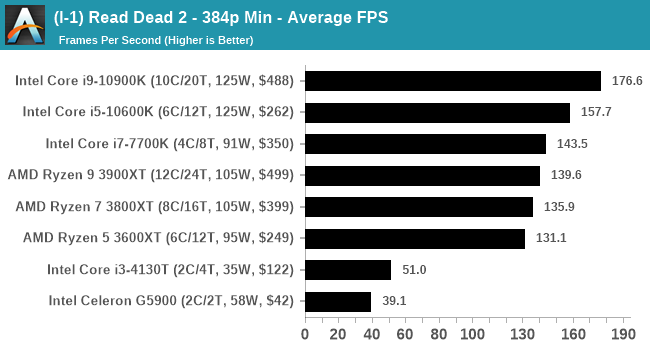 |
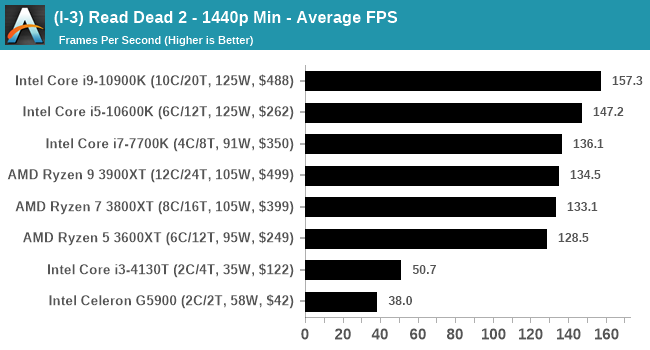 |
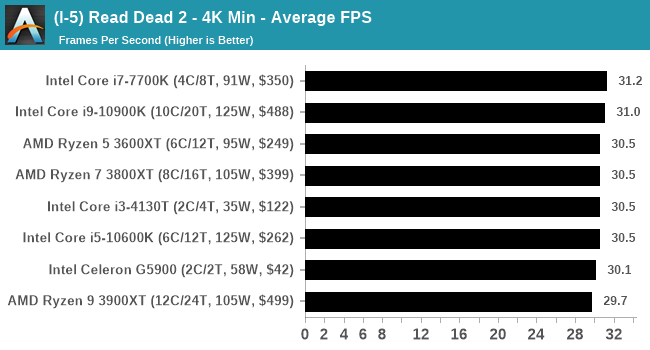 |
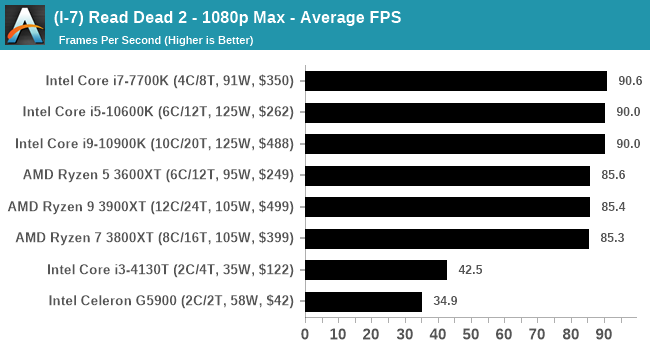 |
| 95th Percentile | 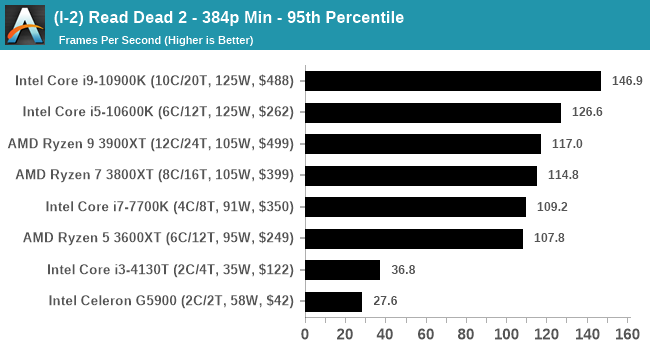 |
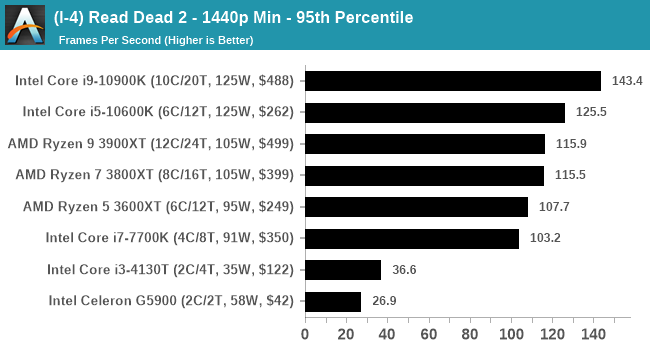 |
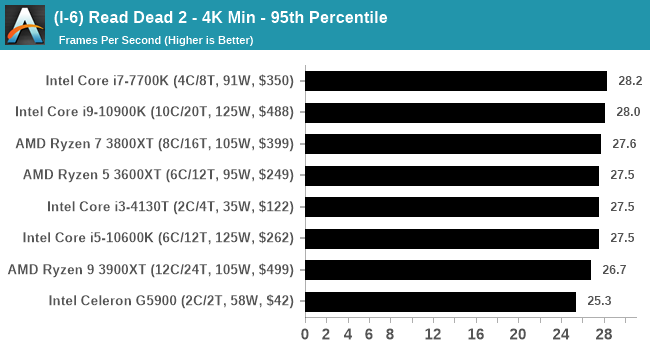 |
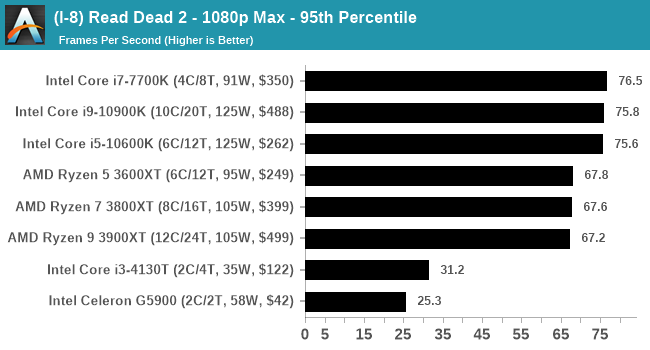 |
All of our benchmark results can also be found in our benchmark engine, Bench.












110 Comments
View All Comments
ruthan - Monday, July 27, 2020 - link
Well lots of bla, bla, bla.. I checked graphs in archizlr they are classic just few entries.. there is link to your benchmark database, but here i see preselected some Crysis benchmark, which is not part of article.. and dont lead to some ultimate lots of cpus graphs. So it need much more streamlining.i usually using old Geekbench for cpus tests and there i can compare usually what i want.. well not with real applications and games, but its quick too. Otherwise usually have enough knowledge to know if is some cpu good enough for some games or not.. so i dont need some very old and very need comparisions. Something can be found at Phoronix.
These benchmarks will always lots relevancy with new updates, unless all cpus would in own machines and update and running and reresting constantly - which could be quite waste of power and money.
Maybe some golden path is some simple multithreaded testing utility with 2 benchmarks one for integers and one for floats.
Ian Cutress - Wednesday, August 5, 2020 - link
When you're in Bench, Check the drop down menu on your left for the individual testshnlog - Wednesday, July 29, 2020 - link
> For our testing on the 2020 suite, we have secured three RTX 2080 Ti GPUs direct from NVIDIA.Congrats!
Koenig168 - Saturday, August 1, 2020 - link
It would be more efficient to focus on the more popular CPUs. Some of the less popular SKUs which differ only by clock speed can have their performance extrapolated. Testing 900 CPUs sound nice but quickly hit diminishing returns in terms of usefulness after the first few hundred.You might also wish to set some minimum performance standards using just a few tests. Any CPU which failed to meet those standards should be marked as "obsolete, upgrade already dude!" and be done with them rather than spend the full 30 to 40 hours testing each of them.
Finally, you need to ask yourself "How often do I wish to redo this project and how much resources will I be able to devote to it?" Bearing in mind that with new drivers, games etc, the database needs to be updated oeriodically to stay relevant. This will provide a realistic estimate of how many CPUs to include in the database.
Meteor2 - Monday, August 3, 2020 - link
I think it's a labour of love...TrevorX - Thursday, September 3, 2020 - link
My suggestion would be to bench the highest performing Xeons that supported DDR3 RAM. Why? Because the cost of DDR3 RDIMMs is so amazingly cheap (as in, less than 10%) compared with DDR4. I personally have a Xeon E5-1660v2 @4.1GHz with 128GB DDR3 1866MHz RDIMMs that's the most rock stable PC I've ever had. Moving up to a DDR4 system with similar memory capacity would be eye-wateringly expensive. I currently have 466 tabs open in Chrome, Outlook, Photoshop, Word, several Excel spreadsheets, and I'm only using 31.3% of physical RAM. I don't game, so I would be genuinely interested in what actual benefit would be derived from an upgrade to Ryzen / Threadripper.Also very keen to see server/hypervisor testing of something like Xeon E5-2667v2 vs Xeon W-1270P or Xeon Silver 4215R for evaluation of on-prem virtualisation hosts. A lot of server workloads are being shifted to the cloud for very good reasons, but for smaller businesses it might be difficult to justify the monthly expense of cloud hosting (and Azure licensing) when they still have a perfectly serviceable 5yo server with plenty of legs left on it. It would be great to be able to see what performance and efficiency improvements can be had jumping between generations.
Tilmitt - Thursday, October 8, 2020 - link
When is this going to be done?Mil0 - Friday, October 16, 2020 - link
Well they launched with 12 results if I count correctly, and currently there are 38 listed, that's close to 10/month. With the goal of 900, that would mean over 7 years (in which ofc more CPUs would be released)Mil0 - Friday, October 16, 2020 - link
Well they launched with 12 results if I count correctly, and currently there are 44 listed, that's about a dozen a month. With the goal of 900, that would mean 6 years (in which ofc more CPUs would be released)Mil0 - Friday, October 16, 2020 - link
Caching hid my previous comment from me, so instead of a follow up there are now 2 pretty similar ones. However, in the mean time I found Ian is actually updating on twitter, which you can find here: https://twitter.com/IanCutress/status/131350328982...He actually did 36 CPU's in 2.5 months, so it should only take 5 years! :D